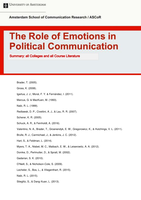Brader, T. (2005).
Gross, K. (2008).
Igartua, J. J., Moral, F. Y. & Fernández, I. (2011).
Marcus, G. & MacKuen, M. (1993).
Nabi, R. L. (1999).
Redlawsk, D. P., Civettini, A. J., & Lau, R. R. (2007).
Scherer, K. R. (2005).
Schuck, A. R., & Feinholdt, A. (2016).
Valentino, N. A., Brader, T., Groenendyk, E. W., Gregorowicz, K., & Hutchings, V. L. (2011).
Brulle, R. J., Carmichael, J., & Jenkins, J. C. (2012).
Hart, S., & Feldman, L. (2014).
Myers, T. A., Nisbet, M. C., Maibach, E. W., & Leiserowitz, A. A. (2012).
Domke, D., Perlmutter, D., & Spratt, M. (2002).
Gadarian, S. K. (2010).
O’Neill, S., & Nicholson-Cole, S. (2009).
Lecheler, S., Bos, L., & Vliegenthart, R. (2015).
Nabi, R. L. (2015).
Stieglitz, S., & Dang-Xuan, L. (2013).
, College 1
Media effect dimensions (What can media have an effect on?) – knowledge, opinions
(individual and public), attitudes, behaviour, issue perceptions, emotions.
Research Paradigms
I. Powerful media (1900 – 1930)
1) Observation of enormous popularity of media
2) Principles of propaganda, media as manipulators
3) Psychological and biological theories
Stimulus-Response Model (S >>> R) (hypodermic needle theory)
II. (a bit less) Powerful media (1940 – 50ies), considering the Black Box, not everybody was
effected the same way. The war of the world: radio-play, made people believe the world
was invaded by aliens.
1) Discovering individual differences in the ‘Black Box’, Why are some people effected
and some not?
2) Intervening factors: existing attitudes, opinions, etc.
3) No isolated individuals but connected members of small networks
Filling out the ‘Black Box’ (S > Black Box > R)
III. Limited effects. Media might re-inforce existing beliefs, but that’s it. People use media for
their own purposes. Uses and gratifications theory.
IV. Return to moderately powerful effects, effects on society, moderate effects era (1970ies).
Knowledge gap hypothesis = people have different resources (high/low education),
everybody profits from media-use, but people with more interest and higher education
profit more from media-use than people with less interest and lower education.
Cultivation theory = media focus on plane crashes/fires, so people start to think the world
in less safe than the actual numbers indicate which the media do not show.
1) Shift to long-term effects of media, social change
2) Increasing knowledge gap, cultivation of fear through the media
V. Return to powerful effects (but not for everyone), agenda-setting, framing
1) Agenda-setting: media affect what people think about
2) Framing: media affect how we think of political issues
3) Not everybody is equally affected – Who is affected? (moderators)
4) Underlying effect mechanisms – How are people affected? (mediators)
Agenda-setting “The press may not be successful much of the time in telling people what to
think, but it is stunningly successful in telling its readers what to think about.” (Cohen, 1963)
Framing refers to the observation that media can portray one and the same topic in very
different ways, emphasizing certain evaluations or only parts of an issue at the expense of
possible others (Schuck & de Vreese, 2006). Citizens with low issue knowledge are affected,
those with high knowledge are not.
“To frame is to select some aspects of a perceived reality and make them more
salient in a communicating text, in such a way as to promote a particular problem definition,
causal interpretation, moral evaluation, and/or treatment recommendation for the item
described.” (Entman, 1993)
Example – We found that the term ‘global warming’ is associated with greater public
understanding, emotional engagement, and support for personal and national action than the
2





